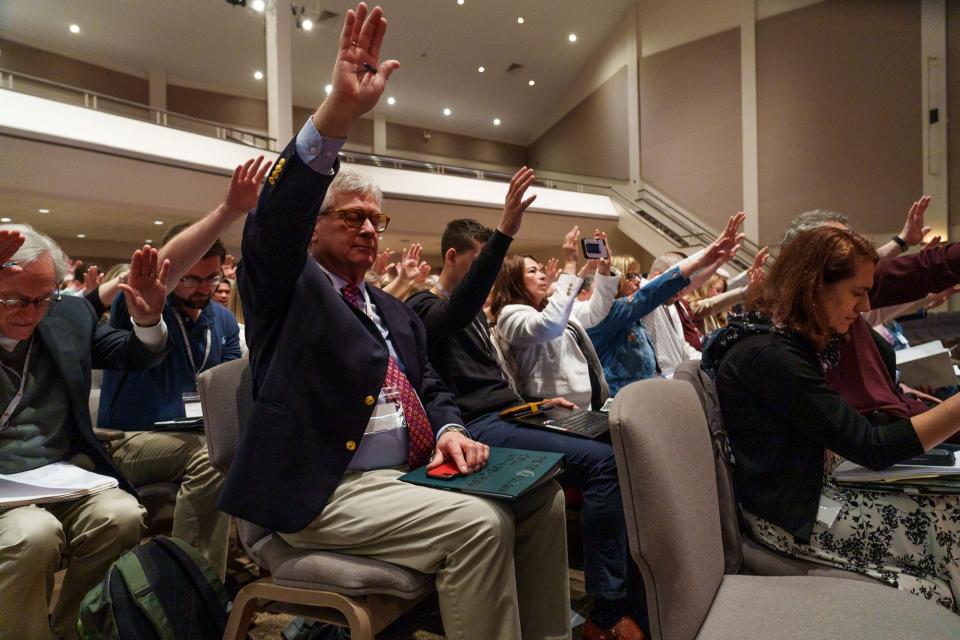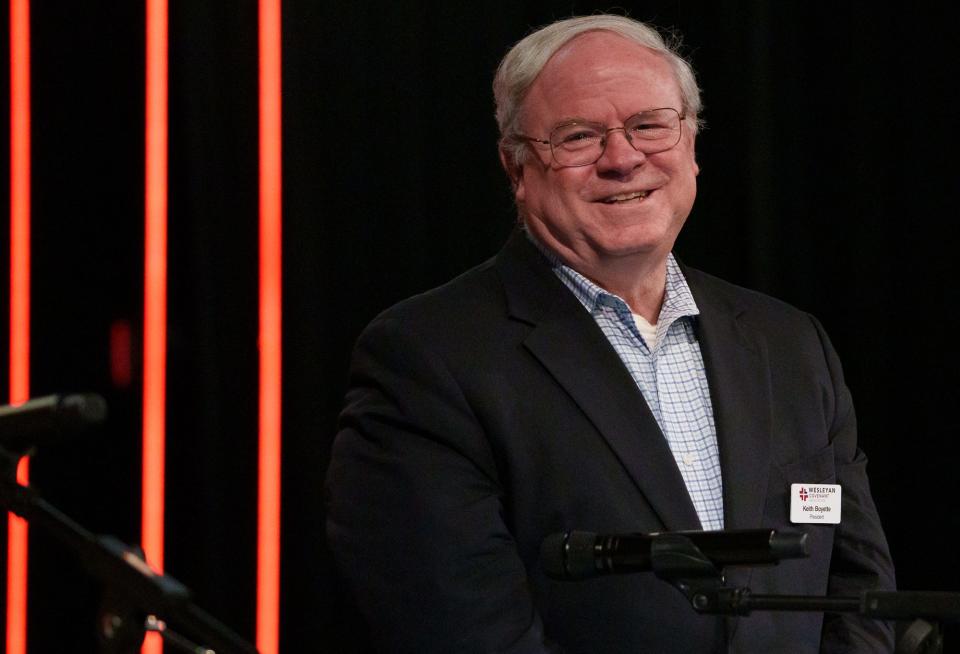Splinter explainer: Will UMC churches outside the U.S. stay or go from the denomination?
- Oops!Something went wrong.Please try again later.
The wave of American churches leaving the United Methodist Church continues to surge on, but the splintering overseas has proved less predictable so far.
The circumstances are more precarious for churches outside the U.S. wrestling with deciding to stay in the UMC or leave for a more conservative, breakaway denomination called the Global Methodist Church. Very few churches in those regions have left, but some leaders have recently declared their intentions.
This summer, lay leaders in the Philippines urged their bishops to support immediate autonomy from the UMC, while 11 African bishops issued a statement expressing their desire to stay in the denomination. The outcome will largely depend on the UMC General Conference, which is the denomination’s international legislative body, in April and the legislation that delegates approve.
United Methodist leaders hope to keep its global footprint intact with a proposal giving regional authorities in other countries more autonomy, one of several policies that traditionalist opponents are protesting they say is delaying the inevitable.
“If there’s a mechanism, we anticipate there will be more clergy, churches and lay members outside the United States in the Global Methodist Church than there will be in the United Methodist Church,” the Rev. Keith Boyette, the Global Methodist Church’s top officer and chief executive, said in an interview.
The Global Methodist Church launched in May 2022 following disagreements over theology and church policy, including dealing with LGBTQ rights. The launch accelerated an exodus of U.S.-based churches, which is now at 6,200-plus and more are expected before end of year.
The UMC, of which many of its general agencies are based in Nashville, is the largest mainline Protestant denomination in the U.S. Outside the U.S., it claims more than 6.4 million members and 12,800-plus churches, according to 2018 data from the UMC General Council on Finance and Administration.
Since its launch, the Global Methodist Church has emphasized its conservative appeal to churches outside the U.S, though UMC leaders have been more skeptical.
“Bold proclamations are not unexpected but when the dust settles, it’s interesting to see what the actual numbers become,” Bishop Thomas Bickerton, president of the UMC Council of Bishops, said in an interview.
Bickerton, who also leads the denomination’s New York Conference, recently visited UMC leaders in South Korea and in the Democratic Republic of Congo, where the African bishops gathered and approved their statement expressing their intent to stay. From Bickerton’s observation, a lot remains up in the air.
Here’s what that overseas landscape looks like right now and how it could change.
What has happened so far outside of the U.S.
The question of whether churches outside the U.S. will stay in the UMC has been just as much a source of anxiety as the splintering in America, though the UMC hasn’t recognized a single church’s departure outside the U.S.
The main policy U.S.-based churches are using to leave the UMC, a process known as disaffiliation and that is outlined in the UMC Book of Discipline paragraph 2553, isn’t “applicable” to regional authorities outside the U.S., which are called central conferences.

There are seven total central conferences — three in Africa, three in Europe and one in the Philippines — which are more directly beholden to the UMC General Conference. For example, the only policy available to churches in central conferences to leave the UMC, as outlined in the UMC Book of Discipline paragraph 572, requires final approval from the UMC General Conference, which meets every four years.
“I think it has been more difficult for churches (outside the U.S.) to get out, but the desire is as intense as it was a 1.5 years ago,” Boyette said.
Much of the focus internationally has been on Africa and the Philippines, where there are large numbers of United Methodists, who are by-and-large more conservative than the American church.
Smaller regional authorities, called annual conferences, in Russia, Belarus, Kyrgyzstan, Kazakhstan, Estonia and the Czech Republic have declared their intention to leave the UMC through formal votes await approval by the UMC General Conference.
What is happening now with the UMC overseas
Some haven’t waited for permission.
The Global Methodist Church has received into its membership churches and clergy from Croatia, England, Germany, Canada, Central Africa Republic, Zambia, Panama, and the Philippines, Bulgaria, Slovakia, Spain, Democratic Republic of Congo, Kenya, according to Boyette. Often, clusters of churches have voted as individual congregations to leave the UMC and change the legal status of their denominational affiliation.
The UMC could go after these churches and try to seize their property by enforcing a trust clause. “But the law is not necessarily favorable in some other countries for a denomination to try to unwillingly keep people in the denomination through control of property,” Boyette said.

Traditionalists are better organized in some regions, such as the African Initiative, an organization that advocates for churches to leave the UMC and join the Global Methodist Church. As a countermeasure to the recent statement from the 11 African bishops about staying in the UMC, the Africa Initiative issued its own statement to deter rank-and-file clergy and laity.
What will happen next in the global debate
The most significant decisions about the future of the UMC globally have yet to happen and will largely depend on the UMC General Conference in April.
The General Conference is set to take up a proposed constitutional change that would effectively elevate the status and autonomy of central conferences to that of U.S.-based regional authorities.
The proposal, known as regionalization, allows for variation in the adoption and enforcement of certain policies across different regions. For example, bishops in Africa can enforce a policy against LGBTQ ordination with less leniency than U.S. bishops.
“It’s safe to say regionalization is the hot topic going into General Conference,” Bickerton said. “It intimately involves our relationship with our central conferences with leadership, discipline, and roll and function, so much so that it will be the dominant feature of the General Conference.”
The regionalization legislation proposed for the UMC General Conference is based on a 2019 declaration called The Christmas Covenant, which Bickerton said was largely intended for churches in the Philippines. But the recent statement from the 11 African bishops also celebrated the proposal.
UMC splinter explainer Why defectors have resorted to lawsuits against UMC officials
Aside from the debates over sexuality and gender, regionalization is responsive to a relationship between the U.S.-based and non-U.S.-based church rooted in colonialism. Still, conservatives have decried regionalization as a Hail Mary attempt to appease both American progressives and traditionalists outside the U.S.
There might also be proposed legislation at the UMC General Conference that would make it easier for churches outside the U.S. to leave the UMC.
Despite heightened media attention on the U.S. dynamics of the UMC’s splintering, debate at the UMC General Conference will be just as focused on the global church.
“There’s a strong chance is that it will be unprecedented,” Bickerton said.
Liam Adams covers religion for The Tennessean. Reach him at ladams@tennessean.com or on Twitter @liamsadams.
This article originally appeared on Nashville Tennessean: United Methodist Church split: Will churches outside the U.S. leave?

